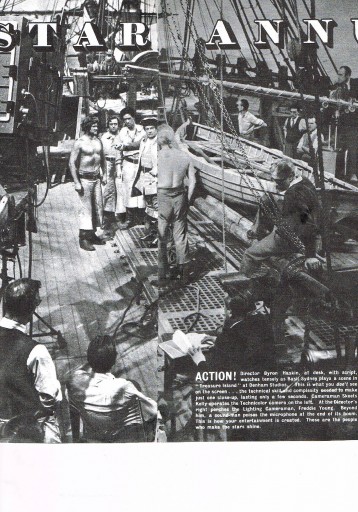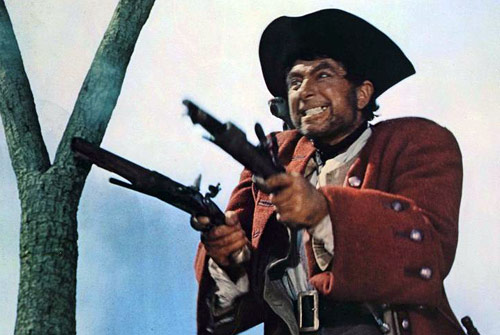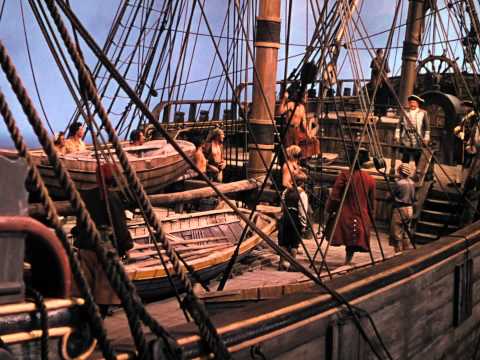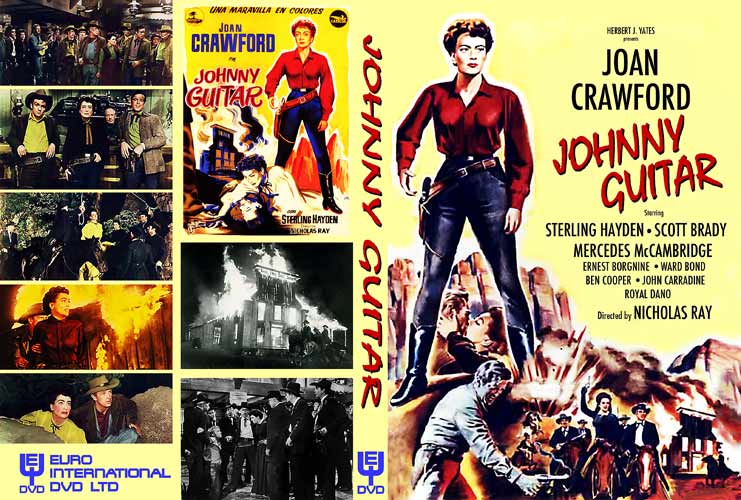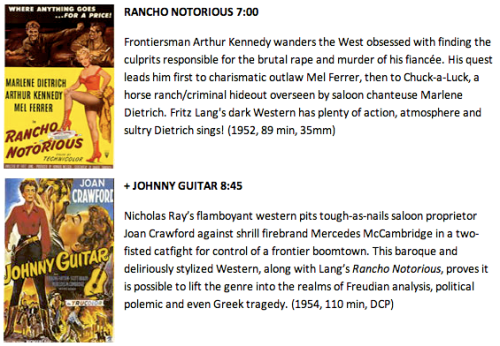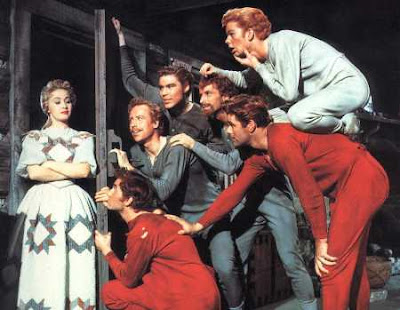

A very pretty Jean Peters starred in this colourful adventure film from 1951
In 1946, a short story by Herbert Ravenel Sass titled “Queen Anne of The Indies”, appeared in the Saturday Evening Post and generated much excitement amongst the New York publishers and Hollywood studios. “Anne of the Indies” was made and released in 1951.

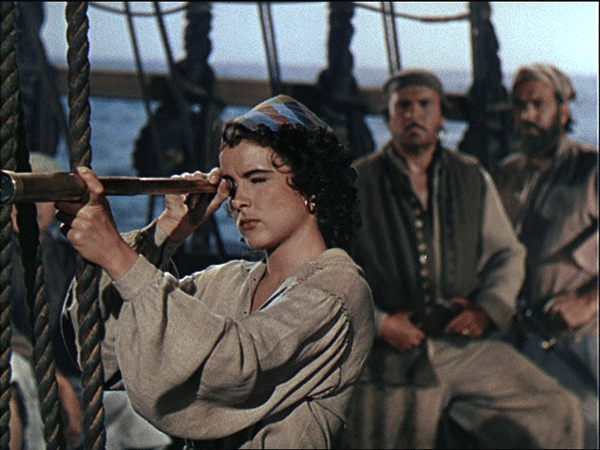

In early 1950, at Fox’s instance, a new script was prepared by Romanian born screenwriter/playwright Arthur Caesar incorporating unused footage shot for “The Black Swan” (1942) starring Tyrone Power. The studio assigned George Jessel to produce while tests were done with Patricia Neal and Valentina Cortese for the title role.

From East Canton in Ohio, Elizabeth Jean Peters grew up on a small farm, majored in literature and won a screen test with 20th Century-Fox as prize for winning the Miss Ohio State Pageant title in the fall of 1945. Owing to a contract with Fox, Jean moved to Los Angeles and later acquired a small part in “I Wonder Who’s Kissing Her Now” (1947). However, it would be her role as Catana Perez (replacing Linda Darnell) in director Henry King’s “Captain from Castile” (1947) that will bring her star treatment and public attention though the film grossed net loss because the studio spent more for it than the market could afford
After a brief slump in her popularity, the 5’ 5” Jean had pursued the studio and convinced them to cast her as “Anne of the Indies”. It was a down to earth, unglamorous role– exactly what she preferred since sometime earlier the studio had put her on her first suspension owing to her refusal to don sexy roles. However, being the current romantic interest of the legendary billionaire Howard Hughes, beautiful Peters with brown hair and green eyes must have found it easy to step over that suspension. Even though she had a celebrated romance with Hughes in 1947, their marriage will take place only in 1957 after living with him off and on for a decade.
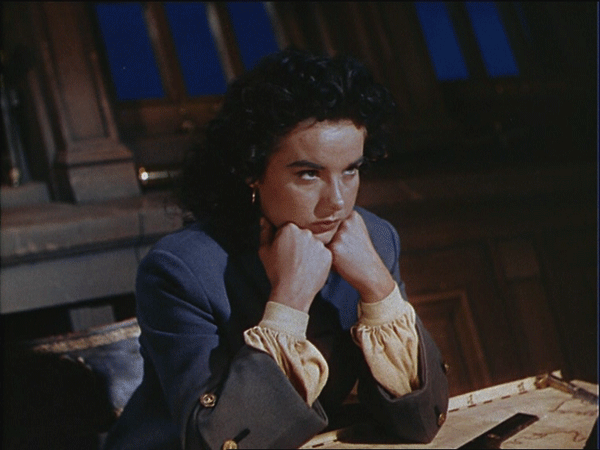
Jacques Tourneur was given the director’s hat for the project in January 1951. Essentially a small-budget director he had a reputation to direct movies on various genres since he always accepted all the scripts offered to him.
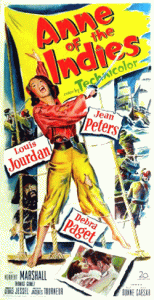 Having finished directing “The Flame and the Arrow” (1950) starring Burt Lancaster and Virginia Mayo, Tourneur was in the right mood for yet another swashbuckler. With a secured contract with Fox and devoid of interference from producer George Jessel, the film went into production at the 20th Century-Fox Studios in Los Angeles.
Having finished directing “The Flame and the Arrow” (1950) starring Burt Lancaster and Virginia Mayo, Tourneur was in the right mood for yet another swashbuckler. With a secured contract with Fox and devoid of interference from producer George Jessel, the film went into production at the 20th Century-Fox Studios in Los Angeles.

As the film begins, we are shown the names of two English ships, Royal Charles and Sea Lady are being stricken off a register of ships for having been destroyed or sunk by the notorious Captain Providence. We then cut to: the deep ocean off Antigua where the English vessel Gemini is preparing to repel the attack of Anne’s flagship Sheba Queen. As the two ships draw nearer and the canons started firing, Anne suddenly appears on the deck of her ship while her men valiantly fought the English, their swords flashing in fierce combat. Even Anne joined her men in the fight. Before long, the English Captain had surrendered.

Inside her cabin, Anne threw the enemy’s flag on top of the wooden desk and was pleased to learn from Dr. Jameson that he had attended to all the wounded. At this time he wanted to tend to Anne’s wound which he was sure would leave a scar on her beauty. Anne was not unfamiliar to scars most of which she had received from the English. But she is not a wench to brood over her scars, has chosen not to show her pain, even now, at her moment of glory though the fact remained that she had lost her sailing master in this assault.
She invited the doctor, her confident, to the deck where her crew were making the prisoners walk the plank – a sight, she was certain, would put some iron in the alcoholic doctor’s soul. The Captain of Gemini was grumbling that he had struck his flag hoping to receive some water. He protested to Anne about the merciless treatment meted out to the prisoners by her men. Anne retorted that she had learned such mercy from the English. Did they show mercy to her brother? They had hanged him in chains in the wharf of Port Royal with all the English just spitting on his face – she snapped at him.

The hatred towards the English that had grown in her heart for the death of her brother, was one of the many scars Anne accumulated in her life that made her reject her femininity. The Captain was given the opportunity to express his last words. All he had to say was that, her brother was a pirate and he deserves the end that he got as Anne will deserve hers. But Anne knew that she had chosen to live with that. “By the veins of your nose you have drunk your king often in wine, now drink him in salt water” With that reply, she ordered the Captain to walk the plank.

It was then she noticed the handsome man in irons being led to the plank, the upper part of his body exposed. They have found him imprisoned in the English vessel which meant he is not a friend of the English. Questioning him, she learned that he is a Frenchman named Pierre François. When she introduced herself to him, it was a revelation to him. Caught in the propaganda that surrounded Captain Providence, Pierre had never expected the buccaneer Captain to be a woman. Furthermore, he had least expected it when her palm cracked on his face for having disrespectfully addressed her as “mademoiselle” rather than in her proper title of “Captain” which displayed the forcefulness of the identity she had chosen.

It was revealed that Pierre was the owner/master of the Bordeaux registered Irish privateer, Molly O’Brien, captured by the English. He is being sent to England to stand trial for having captured too many English ships. Anne had allowed her men the pleasure to make their prisoners walk the plank except for Pierre. Being sea-smart, Anne knew that Pierre, a sea artist, would make a suitable replacement for the navigator she had lost and that was what she did to the displeasure of her Scottish first mate Red Dougal, who had been delegated by Blackbeard to protect her. As for Pierre, who is fond of life, it was not a hard choice to make when his choice was between joining the buccaneers or walk the plank.
When the booty from the Gemini was shared with her crew, Pierre was permitted to choose something for himself. While Pierre decided a woman’s dress, Anne laid her claim on a sword with a long blade, the virility of which reflected on her authority. However, Pierre’s choice had kindled her curiosity to make her enquire if he has a wench somewhere. Pierre would only reply that he is a Frenchman. Anyhow, she let him know that the sword was selected for Captain Teach, Blackbeard, a great sea-rover of a soul whom she is certain she would find in Nassau where they plan to get the supplies. The Sheba Queen headed for Nassau.


The Black Anchor Tavern in Nassau looked a beehive of boisterous merriment. Apparently, the tavern was taken over by Blackbeard and his men and their women for partying and their idea of fun appeared to be to laugh, shout, fight, bear-wrestle, break things, get drunk, etc in the dreadful manner possible. The enormous figure of Blackbeard sat at the head of a wooden table with a woman on his lap, drinking heavily and having a great time.

It was during the bear-wrestling that Anne and her entourage walked in. At the sight of Blackbeard, Pierre had tried to excuse himself to go off for some business in Nassau, but reluctantly stayed when Anne assured him of her protection. So excited was Blackbeard to see her there, that he said she’s like a Northeaster after a calm.

Although Blackbeard had doubts about Pierre which was also intensified later by Dougal, his main interest was focused on Anne and the sword she presented him. When all of his men shied away from being a willing partner to the impulsive Blackbeard to help try the new sword, Anne was ready to let him try to carve her. A fierce but friendly duel of swords broke out between Anne and Blackbeard in which Anne displayed some playful but competent skills of swordsmanship but it was pretty obvious that he could have won over Anne easily. However, when Blackbeard was momentarily distracted, Anne grabbed the chance to win; a trickery which Blackbeard merely laughed off in a fatherly manner. Then again, Anne’s glory was short-lived when she learned from Dougal that Pierre had slipped out of the Tavern while the duel was on. The confidence she had placed in him has been displaced.

Later, confronted by Anne in her cabin, Pierre didn’t provide her with a proper explanation about his absence, to satisfy her doubt about his loyalty. He had neither gone to see a wench, nor is he a spy because he knows nothing of her plans. All Nassau knows that she’s in the port. Suspicious that he is hiding a secret, she ordered Dougal to put him in irons. Subsequently, he was tied up on the deck and mercilessly flogged until Dr. Jameson convinced her to stop.

Dr. Jameson was evidently dismayed for having been ordered by Anne to search Pierre’s cabin where he had found half of a map tucked inside his mattress. Though Anne cannot read, she can read from patterns. Assisted by Dr. Jameson, she finally figures out that the map is a link to Captain Henry Morgan’s treasure. When Morgan (ca. 1635-1688) captured Panama City, he had taken a king’s ransom which has not been accounted for.

Having matched the piece of map with her main map, she questioned Pierre, now lying on the wooden floor of her cabin, drained from “the taste of the cat”. Pierre had no qualms in telling her that he had bought it five years ago from an inn-keeper on the Bordeaux waterfront who found it in the body of a lodger of his. Once Anne assured him to make him equal partner with her, Pierre opened up further and related to her that his men in Porto Bello had told him of a Portuguese in Nassau trusted by Henry Morgan, In fact Pierre had been taken prisoner by the English while he was heading to Nassau to meet the Portuguese. At Nassau, Pierre had learned from the Portuguese man that a man called Pedro Mendoza living in Port Royal in Jamaica possessed the other half of the map.

It was then Dr. Jameson remarked to her that since she now knows what Pierre knows, she could very well kill him and go after the treasure on her own. But Anne would have none of that, for she had given Pierre her word. And that counts.

Port Royal was the lion’s den – the Headquarters of England’s Caribbean Squadron. That’s where they will go once they careen the hulk of Sheba Queen encrusted with hardened barnacles, to restore the ship to its proper speed. Dr. Jameson confirmed that the parchment and the ink of the map looked authentic to him.

As Blackbeard had taught her, Anne had carefully docked her ship in a secret cove, known only to Blackbeard and Anne, ideally positioned to cannon and command the passage through the reef while her ship lay inoperable.

Later, while she was walking along the beach with Pierre, she was surprised to learn that he was born in Paris. Anne advocated that he can take her there as a partner after they have lifted the treasure. But overriding this subject was her curiosity to know for whom he had chosen that yellow dress.

He had obviously noted the anxiety in her question and told her that it is for no one in particular – perhaps for a woman he hoped someday to meet. Having caught with her guard down, she quickly pulled herself up to her rank, but her sudden change in manner essentially gave away the tell-tale sign of affection for him that was growing in her heart.
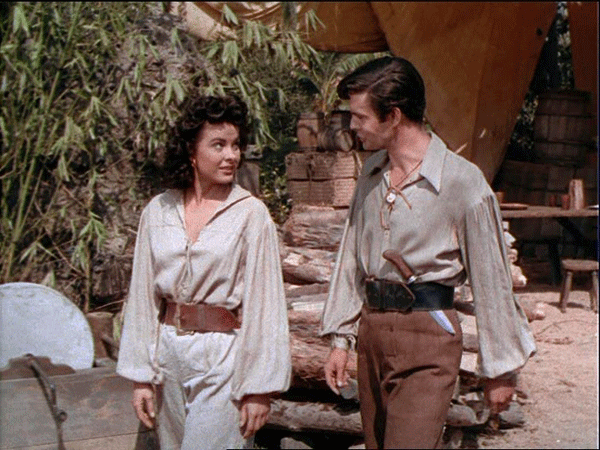
The following day, Pierre walked into his make-shift cabin and found Anne trying on the yellow corseted dress he had chosen from the booty. This is the moment for which that dress was made for. She looked like a breath of spring. Even though her face looked unaffected from his sudden intrusion, the thoughtful Frenchman knew that he had awakened the feminine side of this ruthless pirate queen.

Well, she can’t underestimate his ability to get through to her heart and to melt away her defences. But he would use his power responsibly. Pierre helped her tie the back ribbons of the dress, an act which acted as the precursor to a conversation that stirred the woman inside her, exposed her inner feelings she was silently weaving around Pierre. She dared him to tell her “how a Frenchman, a gentleman, made love?” knowing that it would draw him to her. Soon, they merged into a passionate kiss.

It seems all good things in life are not meant to last. The expression of their “burning” desire turned out to be short-lived and frustrating as Dougal suddenly walked in and caught them in the act.

On hearing the news about an approaching ship, Anne’s spyglass confirmed the arrival of Blackbeard’s flagship “(Queen Anne’s) Revenge”. How happy she appeared in welcoming Blackbeard with Jamaican rum. She listened to him saying that he had looked for her in Tortuga and had realised that she’s docked here to careen.

Without losing much time, Blackbeard accused that Pierre is a traitor. He is Lieutenant Pierre François La Rochelle of the French Navy. He had seen Pierre at Martinique when the French hanged his colleague Sam Austine from a yardarm. Confronted once again by Anne, Pierre explained that everything which Blackbeard told was true. He merely neglected to mention about the commission because the memory of that chapter was painful to him. He was cashiered from the navy in disgrace. He had witnessed the hanging only because the entire officers were ordered to be present. Anne is in command here, and he is not on Blackbeard’s deck. She can be assured that he will serve her loyally.

Disregarding her support for Pierre, Blackbeard’s sword struck out at Pierre. Abruptly, Anne’s sword lashed out at Blackbeard with dynamic forcefulness. During the angered spat of words that followed, Anne slapped his face- in front of his men. She ordered him and his men off the island. The line has been crossed. Blackbeard never forgets an insult. Now there will be war between them.

As Blackbeard and his men left the island, Anne ordered Dr. Jameson to care for Pierre lying unconscious on the ground. Before she moved off from Pierre, she couldn’t resist planting a kiss on his forehead.
The Sheba Queen was safely anchored off the coast of Jamaica. Given that Anne was denied from going to the island in his place to obtain the other half of map from Petro Mendoza, she arranged with Dougal to take Pierre on a row boat to leave him ashore at the Portland Point and wait for him on the beach. She gave Pierre some English Guineas to pay the man and advised him to offer Mendoza a share of the treasure if he insists for more.

At Port Royal, Pierre went straight to “The Governor’s Tavern” where the English Aristocrats were engaged in smoking, drinking, playing table games or other things such men usually do in such places. Pierre was recognised as “Captain La Rochelle” by the Maitre d’ and promised to arrange the people whom Pierre wanted to meet urgently.

In a dark room upstairs, he met a pretty woman we soon discover to be his wife Molly La Rochelle. He confirmed to her that their plan has succeeded and that the legendary Captain Providence is a woman. They seal their reunion with a kiss before he was called downstairs to meet up with the English Naval officers who have engaged him to entrap the pirates.

The English were rejoiced at the news that the Sheba Queen was anchored off Portland Point and will remain there till daybreak. And, of course, they appreciate that Captain Providence suspects nothing though they were rather surprised to learn that the notorious pirate is a female. With this information in hand, the English attack Anne of the Indies …..

As Darryl Zanuck once said, “Success in movies boil down to three things: story, story, story.” The final climax of the film was subject of deliberations since Zanuck was not satisfied by the motive provided for Anne. The result was that Dunne suggested shooting the climax in different ways. However, after the shooting was completed, having found that the present ending was unsatisfactory to the audience, the ending was again modified with further retakes. According to Tourneur’s contract which stipulated that the production was to be completed within fifteen weeks, the production of “Anne of the Indies” must have been wound up before May, 1951 since by then Tourneur was supposed to be in Argentina for the production of “Way of a Gaucho”.

Adventure movies call for a directorial and an acting style which is well known to adventure directors such as Raoul Welsh, Howard Hawks, John Huston, Richard Fleischer, Henry Hathaway, Michael Curtiz, and Jacques Tourneur. Shot in Technicolor by Cinematographer Harry Jackson and ably edited by Robert Fritch, director Jacques Tourneur’s film features restraint and admirable performances of his stars in well made up sets, lighting and studio locations.

The film truthfully portrays Anne as a ruthless pirate who has denied her femininity and doesn’t know what it means to be a woman, or to be loved. In order to illustrate Anne’s crisis of identity, Tourneur used a scene in the beginning of the film to establish Anne’s strong heart and the softness of her bosom when Dr. Jameson tends to her wound. Despite Jean Peters’ cute and pretty looks which occasionally subdue her efforts to make Anne look dangerous and ruthless, her performance with an athletic agility is flawless though, couple of times, her cheerful countenance has appeared rather teasing.

Louis Jourdan’s performance in the role of Frenchie merited critical acclaim. Ever since Zanuck had that terrible polo ball accident in late December 1941, he had switched his interest in sport to croquet which he used to arrange on the lawn of his house in Palm Springs. Frequented by a cross-section of Hollywood society, international celebrities, etc, his lawns became the croquet capital of California. Jourdan who was a contract star of Fox and best of the regulars to Zanuck’s house, was found to be perfect fit for the role of Pierre.
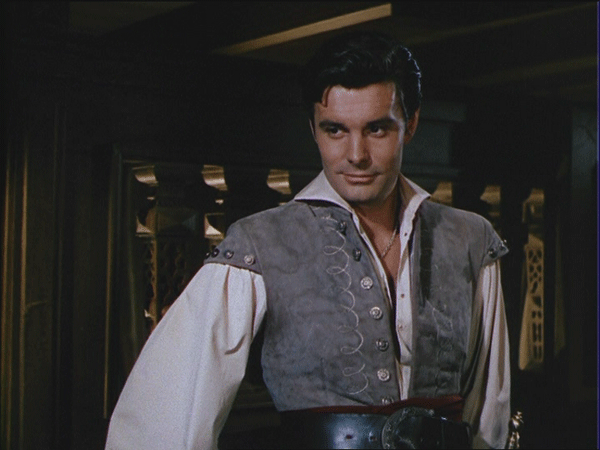
Louis Jourdan’s movies conjure up an image of him as a suave, dashing, romantic charmer. In spite of this, the Marseilles born Jourdan (aka Louis Gendre) had also managed to appear in villainous roles. Beginning his acting career in the French film “Le Corsaire” (1932), Jourdan became a star after producer David O. Selznick cast him in Alfred Hitchcock’s court room drama “The Paradine Case” (1947) for which Franz Waxman was the music director. But his finest performance before he acted in “Anne of the Indies” was in Max Ophuls’ “Letter from an Unknown Woman”.

British actor Herbert Marshall (1890-1966) with considerable stage experience acts as the alcoholic Dr. Jameson who helplessly hovers around watching Anne trapped in her crisis of identity. The mannerism of the wise and philosophical Dr. Jameson in the scenes where Anne displays her determination to acquire the respect she deserves; when she is in conflict with her human emotions; is well portrayed by Marshall.
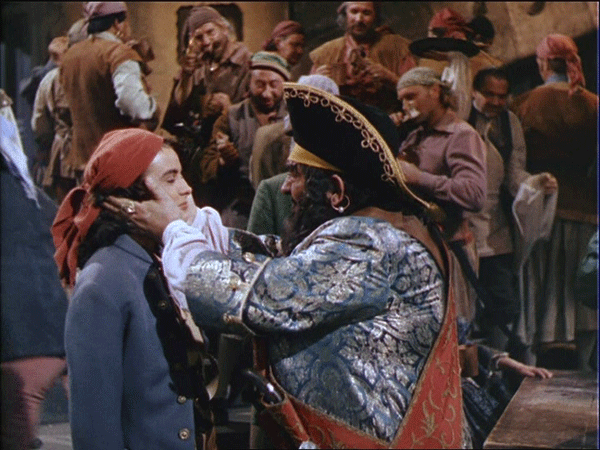
In the role of the boisterous Blackbeard, the heavyset, stage character actor Thomas Gomez (Sabino Tomas Gomez – 1905-1971) made use of the opportunity to drink, laugh, turn tables, and swash his sword to realistically portray the larger-than-life of the renowned pirate.

Gomez was a member of the Alfred Lunt and Lynn Fontanne theatre group before he ventured into movies. An aficionado of gourmet dining and a close friend of Jean Peters, he had co-starred with her in “Captain from Castile”

Tall and hefty, England born actor James Robertson Justice (James Norval Harald Robertson Justice – 1907-1975) with whiskers and booming voice had completed a series of films, viz. “The Black Rose” and “The Magnet” (1950), “Blackmailed”, “Pool of London”, “Captain Horatio Hornblower” and “David and Bathsheba” (1951) prior to his role as Red Dougal.

The mannerism of Dougal when Anne chose Pierre as her sea artist when she knew nothing of him; his confidential talks with Blackbeard and Dr. Jameson; his ever watchful eyes on Anne; the suppressed outrage on his face when he caught Anne and Pierre kissing – have all been perfectly portrayed by Justice.

Hailing from a show biz family, the 5’ 2” (157cm) Debra Paget (Debralee Griffin) obtained an acting contract from 20th Century-Fox at the age of 14, debuting in “Cry of the City” (1948). Having earned proficiency in speaking from Helena Sorrell, the dramatic coach of 20th Century-Fox, and fairly active in movies at that time, she co-starred with Louis Jourdan and Jeff Chandler in director Delmer Daves’ “Birds of Paradise” which also hit the screens in 1951.

Although Paget’s role in “Anne of the Indies” is confined to few dark scenes, her effervescent beauty lights up the darker scenes which are rampant in many of Tourneur’s films. Appearing pale and innocent, Paget has nothing much to do except look distressed and wear a few moments of brave face when she antagonizes Anne over Molly’s rights over her husband.

Other members of cast are Francis Pierlot (Herkimer), Sean McClory (Hackett), Holmes Herbert (British sea captain), Byron Nelson (Bear handler), Douglas Bennett (Bear wrestler), Mario Siletti (Auctioneer), etc.

Notwithstanding the lesser budget, the film features sets and props with truthful authenticity, there are Naval cannons, antique swords, males’ earrings and some of the guns used by the pirates and the English are even Flintlock pistols.

The artistic and talented art directors Lyle Wheeler (1905-1990) and Albert Hogsett have faithfully created the set pieces, though standard and familiar, with the expertise of set decorators Thomas Little and Claude Carpenter.

Lynn had started his career at M.G.M when David Selznick hired him to work under production designer William Cameron Menzies on “Gone with the Wind” following which he ran the art department of Twentieth Century-Fox from 1944 to 1960. Lynn won five Academy Awards for Best Art Direction after having been nominated twenty-nine times, four of which in 1951.

While the makeup is by Ben (Benjamin Emmet) Nye, the film’s wardrobe is directed by American Costume designer Charles Le Maire (1897-1985) who ran the Wardrobe department of 20th Century-Fox from the early 1940s. For this film he had collaborated with Costumes designer Edward Stevenson (1906-1968) who himself started in Hollywood from 1922 and became the chief designer at RKO from 1936-49.

Although most of the costumes are standard pirate and navy gear which kept up the atmosphere, the feminine costumes for Jean Peters and Debra Paget and for some extras are very minimal. Apart from the yellow dress Anne wears inside the make-shift cabin, the other one is a white nightgown shown in very dim lighting as she gazed at the glittering sea.

German composer Franz Waxman (Franz Wachsmann – 1906-1967) with orchestration by Edward Powell have provided a rousing score that blend well with the romantic nature of the story. Other than montage, music is one of the two most “invisible” contributing arts to cinema and Waxman is renowned for his very close understanding of when music should appear in the narrative.

Arriving in America in 1934, Waxman provided his first original score for “Bride of Frankenstein” (1935) after which he worked for two years with Universal Studios, before moving to M.G.M and later onto Warner Bros until he won the Academy Award for “Sunset Boulevard” (1950) and “A Place in the Sun” (1951).

Years and years later, this routine swashbuckler evoked some deliberations in seminars and conferences because of the identity crisis of the lead character. There were also some writings including an essay titled “Femininity and the masquerade: Anne of the Indies”.
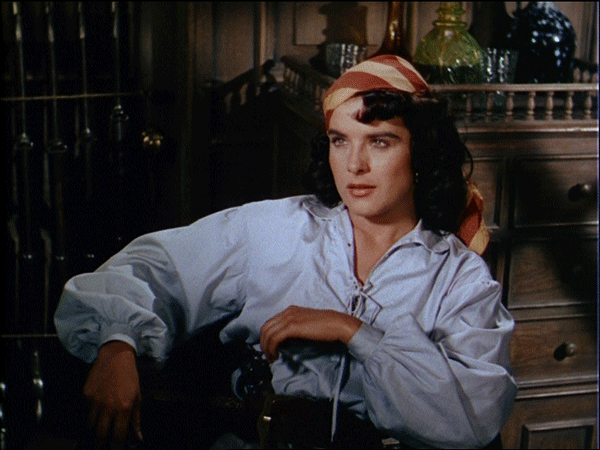
Considering the lack of depth in the psychological density of the main characters and also in the thinly plotted story, I would think this movie was just another job for Tourneur.

I would also like to think that Tourneur made this film without any alternative agenda other than to make a simple pirate tale – some 81 minutes of entertainment which has all the virtues of the genre: sea-battles, swashbuckling, adventure and drama with a twist showcasing the protagonist as a female dressed in male attire to suit the environment of the buccaneers of the story; and also, to differentiate this film from a series of swashbuckler films featuring male leads various studios were chucking out during 1940s and 50s.

Anne of the Indies cannot be compared to a lively, colourful period film featuring a protagonist with the lighter-than-air agility of Douglas Fairbanks or an extrovert, acrobatic hero portrayed by Burt Lancaster. Nevertheless, this old-fashioned harmless family movie has an underlining story of Anne going through her identity crises, searching for love which is quite unfamiliar to her.

Anne’s love is her weakness and to us it has made her human, even though she is riddled with faults. By making Anne endearing to us, lovely Jean Peters leaves a memory of a breed of heroines long gone from our screens. Until next time, Ciao, Jo.


(This review is dedicated to the memory of lovely Jean Peters)
